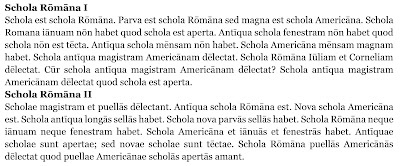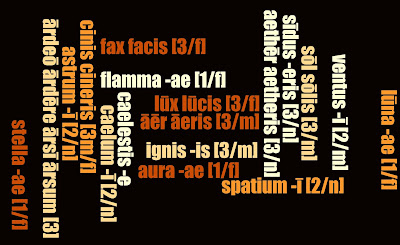Complete the Latin translations with the words listed below. Note the different ways the ablative absolute construction can be conveyed in English.
- The teacher got angry because the boy was shouting in school. │ __________ in ludō __________, magister īrātus factus est.
- Since the boys are shouting in school the teacher is getting angry. │ __________ in ludō __________, magister īrātus fit.
- As the thief is running away, Sextus shouts in a loud voice. │ __________ __________, Sextus magnā vōce clamat.
- With Titus greeting (them), the boys enter the changing room. │ __________ __________, puerī in apodyterium ineunt.
- Since Caesar is coming, everybody is afraid. │ __________ __________, omnēs timent.
- Although the leader is encouraging his soldiers, the enemies are coming. │ __________ mīlitēs eius __________, hostēs veniunt.
- While the soldier was watching the river, the enemies seized the camp. │ __________ flūmen __________, hostēs castra cēpērunt.
aspiciente; Caesare; clamante; clamantibus; confugiente; duce; fūre; hortante; mīlite; puerīs; puerō; salūtante; Titō; veniente
____________________
- Puerō in ludō clamante, magister īrātus factus est.
- Puerīs in ludō clamantibus, magister īrātus fit.
- Fūre confugiente, Sextus magnā vōce clamat.
- Titō salūtante, puerī in apodyterium ineunt.
- Caesare veniente, omnēs timent.
- Duce mīlitēs eius hortante, hostēs veniunt.
- Mīlite flūmen aspiciente, hostēs castra cēpērunt.


































